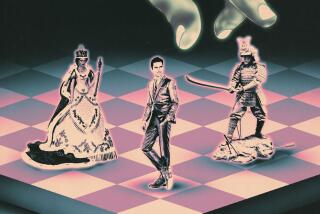Television Reviews : PBSâ âDo Unto Othersâ Probes Tricky Ethical Issues
Ethics, suddenly, are in the air. George Bush had hardly warmed his chair in the Oval Office last week when he announced a commission to write a new code of ethics for government employees. Ivan Boeskyâs and Michael Milkenâs claims as business heroes have fallen in a wave of criminal investigations. And a new PBS series, âEthics in Americaâ (at 10 tonight on Channels 28 and 15), is a concerted attempt to ensure that ethics becomes more than 1989âs politically hot trend.
It arrives courtesy of former CBS News executive and media critic Fred Friendly, whose âMedia and Societyâ seminars at Columbia University spawned this and the previous âThe Constitution: That Delicate Balance.â Friendly, a journalist who has often questioned the news mediaâs value-free approach to the First Amendment, makes clear in his introduction that the discussion of constitutional limits and liberties leads organically to a discussion of ethics. Beyond âthe right to doâ something, what is âthe right thing to doâ?
In tonightâs discussion, âDo Unto Others,â Harvard Law Schoolâs Charles Ogletree posits hypothetical situations to a panel of 15 not-so-ordinary citizens. The situations involve difficult personal ethical decisions far from the realms of Wall Street and Pennsylvania Avenue. The responses of the panelists, from Supreme Court Justice Antonin Scalia to TV correspondent Linda Ellerbee, produce some surprising instances of confusion and intellectual cogency.
A student gets the answers to a college admissions test from friends so he can realize his ambition of attending Harvard. He tells his father. Should the student throw out the test? Should he name his friends?
Scalia: âHe shouldnât turn in (his friends) and I donât know why. Who is the immediate victim of cheating?â Ellerbee simply feels that turning them in is wrong. The University of Utahâs Chase Peterson thinks that acknowledging the price for cheating is the first step to manhood, and that the next step is reporting the other cheaters.
Ogletree confronts the panel, often playacting a character in the ethical drama, with issues of adultery, intervention in public displays of child abuse, and the extent to which we can personally help the homeless.
This last subject provocatively links the personal and social in ways that drive deep wedges between the participants. Author Willard Gaylin argues that private charity is a diversion from facing societyâs responsibility. Minister Calvin Butts counters that the handout today may save a life tomorrow.
The viewer will probably sweat through some seemingly unanswerable questions along with the panelists, who are sometimes reduced to rapping their fingers on the table in search of a response.
This search appears to be no less than the quest for this countryâs moral center. Next week, the answers get no easier: How do lawyers defend a killer?
More to Read
The complete guide to home viewing
Get Screen Gab for everything about the TV shows and streaming movies everyoneâs talking about.
You may occasionally receive promotional content from the Los Angeles Times.






